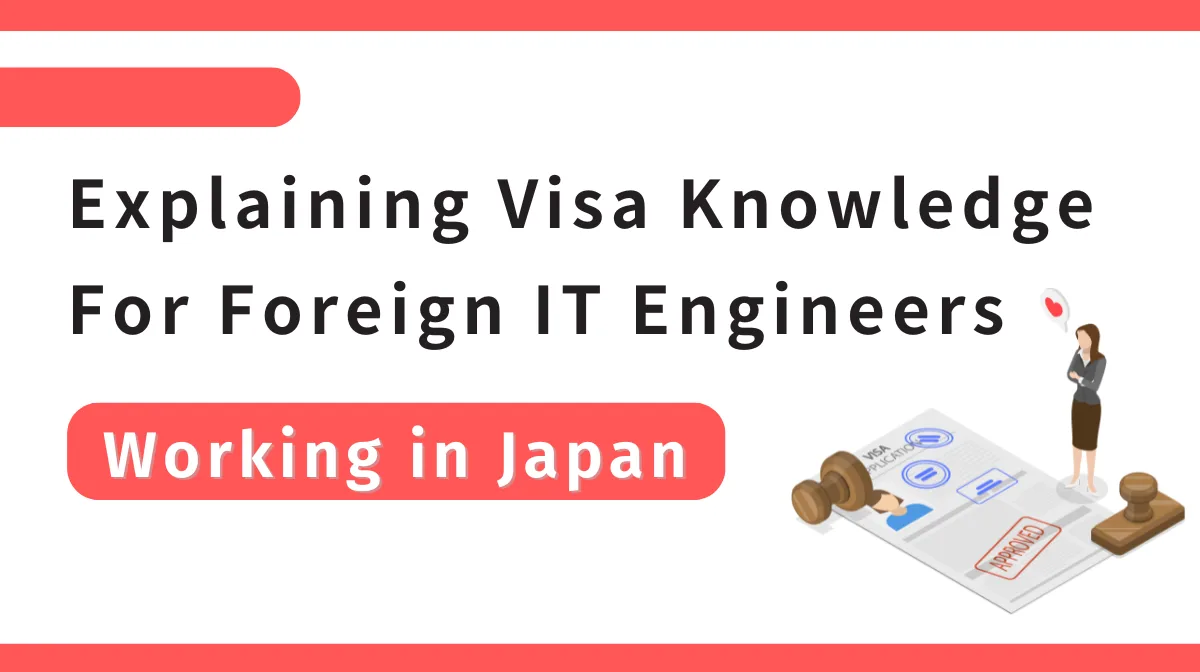Obtaining the appropriate visa is an essential first step for IT engineers working in Japan.
From the common “Engineer/Specialist in Humanities/International Services Visa” to the more privileged “Highly Skilled Professional” residence status, there are options to suit various situations.
This article provides detailed explanations of the required documents, application procedures, and important considerations to support a smooth visa acquisition process.
- Visa types for IT engineers in Japan
- Required documents for successful applications
- Common pitfalls and how to avoid them
1. Types of Work Visas Available to Engineers and Their Requirements

The most common work visa required for foreign engineers to work in Japan is the “Engineer/Specialist in Humanities/International Services Visa”
This visa is granted to technical professionals in science and engineering fields or IT engineers who meet certain requirements related to academic background, income, and practical experience.
Reference: Ministry of Foreign Affairs: Work Visa
Basic Knowledge About the Engineer/Specialist in Humanities/International Services Visa
The Engineer/Specialist in Humanities/International Services Visa is intended for foreigners engaged in the following fields
- Technical fields
(mathematical sciences, physical sciences, chemistry, information technology, mechanical engineering, etc.) - Humanities fields
(languages, literature, education, business management, etc.) - Fields related to foreign cultures
(translation, interpretation, etc.)
Specific Occupations
System engineers, IT engineers, programmers, web developers, mechanical engineers, management consultants, designers, language teachers at private companies, etc. qualify under this visa category.
This visa can be obtained if you have an employment contract with a Japanese company for one of the above occupations and meet certain standards for academic background or practical experience.
After acquisition, residence status is granted for 5 years, 3 years, 1 year, or 3 months.
Reference: Immigration Services Agency: Engineer/Specialist in Humanities/International Services Visa
How to Utilize the Points-Based System for Highly Skilled Professionals
The Points-Based System for Highly Skilled Professionals is a system designed to promote the recruitment of foreign talent with specialized knowledge and skills. Foreign nationals with the Highly Skilled Professional status are referred to as “Highly Skilled Professionals”
Business activities are classified into three categories
“Advanced Academic Research Activities” “Advanced Specialized/Technical Activities” and “Advanced Business Management Activities”
Those who score 70 points or more according to evaluation criteria such as “academic background,” “professional career,” and “annual income” in each activity category are recognized as highly skilled professionals.
Preferential Treatment for Highly Skilled Professionals
Highly Skilled Professional is a residence status that provides preferential immigration treatment.
“Highly Skilled Professional (i)”
Allows for multiple residence activities, grants a 5-year period of stay, relaxes permanent residence requirements, permits spouse employment, and allows for parent or household worker accompaniment under certain conditions.
“Highly Skilled Professional (ii)”
In addition to the same preferential measures as category (i) such as spouse employment, it permits activities in almost all work-related categories and provides an unlimited period of stay. It is possible to change from category (i) to (ii) after engaging in activities for 3 years or more under category (i).
Reference: Immigration Services Agency: Points-Based System for Highly Skilled Professionals
2. Prepare Thoroughly! Documents Required for Visa Application and How to Obtain Them

When applying for a visa, you must submit the “Application for Certificate of Eligibility” and documents according to the category of the company where you will work.
The categories used in applications are divided into four types based on company size, etc.
Category 1 mainly includes listed companies, Category 2 includes large non-listed companies, Category 3 includes small and medium-sized enterprises, and Category 4 includes startups, etc.
[Category 1]
- Companies listed on Japanese stock exchanges
- Mutual companies engaged in insurance business
- Japanese or foreign national/local governments
- Independent administrative institutions
- Special corporations and authorized corporations
- Public interest corporations authorized by Japanese national/local governments
- Public corporations specified in the Table 1 of the Corporation Tax Act, etc.
[Category 2]
Organizations or individuals with a withholding tax amount of 10 million yen or more in the “Statement of Payment of Salaries, Wages, etc.” within the “Statement of Tax Withholding” for the previous year, etc.
[Category 3]
Organizations or individuals who have submitted a “Statement of Tax Withholding” for the previous year for their employees (excluding companies that fall under Category 2)
[Category 4]
Organizations or individuals not falling under Categories 1-3
Reference: Immigration Services Agency: Application for Certificate of Eligibility
Documents to be Prepared by the Applicant
When applying, you need to prepare common documents that are mandatory and various documents that differ by category.
The documents to be prepared by the applicant mainly clarify the content of the applicant’s activities.
Common Documents
- Application for Certificate of Eligibility
- Photo (4cm height × 3cm width)
- Return envelope (with address and stamp for registered mail)
Various Documents [Categories 1 & 2]
- Documents proving the possession of the title of “Technical Specialist” or “Advanced Technical Specialist” for those who graduated from technical schools (such as a graduation certificate)
[Categories 3 & 4]
- Resume showing experience in the applied occupation
- One of the following four documents proving academic and professional background:
- Graduation certificate
- Employment certificate showing the period of engagement in related work
- For IT engineers, certificate of passing or qualification certificate for a test/qualification related to “information processing technology” as determined by the Minister of Justice
- For those engaged in international business, etc., documents proving more than 3 years of practical experience in related work, etc.
Reference: Immigration Services Agency: Application for Certificate of Eligibility
Documents to be Prepared by the Employing Company
In addition to the common documents and those prepared by the applicant, the employing company must also prepare various certificates.
[Category 1]
- Copy of quarterly report or document proving listing in Japan, etc.
[Category 2]
- Copy of the “Statement of Tax Withholding” for employees for the previous year (with receipt stamp), etc.
[Category 3]
- Copy of the “Statement of Tax Withholding” for employees for the previous year (with receipt stamp), etc.
- Certificate of registered matters
- Documents clarifying business content (company brochure or equivalent showing history, organization, officers, business details, major business partners, achievements, etc.)
- Financial statements for the most recent fiscal year (copy)
[Category 4]
- Documents proving the reason why the “Statement of Tax Withholding” for employees for the previous year cannot be submitted (For tax-exempt institutions: exemption certificate or other documents) (For non-exempt institutions: copy of establishment notification, copies of “Calculation Sheet for Income Tax Withholding from Salary/Retirement Income, etc.” for the most recent 3 months, or documents proving approval of special tax payment arrangements)
Reference: Immigration Services Agency: Application for Certificate of Eligibility
■日本でエンジニアとしてキャリアアップしたい方へ
海外エンジニア転職支援サービス『 Bloomtech Career 』にご相談ください。「英語OK」「ビザサポートあり」「高年収企業」など、外国人エンジニア向けの求人を多数掲載。専任のキャリアアドバイザーが、あなたのスキル・希望に合った最適な日本企業をご紹介します。
▼簡単・無料!30秒で登録完了!まずはお気軽にご連絡ください!
Bloomtech Careerに無料相談してみる
3. Timeline for a Successful Visa Application
When applying for a visa, each step from preliminary preparation to submission and actual work permission takes time.
Estimated Preparation Period Before Application
Before applying for a visa, you must obtain a COE (Certificate of Eligibility). After concluding an employment contract with a company and gathering the necessary documents, you proceed with the “Application for Certificate of Eligibility”
The application can be submitted by the applicant, a representative from the hiring company, or a visa application agency. If the applicant is overseas, the company or a representative submits the application to the Immigration Services Agency of Japan.
The review process takes approximately 2-3 months.
Reference: Immigration Services Agency: Application for Certificate of Eligibility
Process from COE Application to Visa Acquisition
After applying for the COE, following the review, the approved COE is delivered to the applicant or a representative such as the Japanese company. If the applicant is overseas, the COE received by the company is mailed to the applicant.
As the visa application must be done by the applicant, those residing overseas can apply for a visa at a Japanese diplomatic mission in their country once they receive the COE. Visas are typically issued within 5 business days of application.
The COE has a validity period of 3 months from issuance, so procedures must be completed and entry into Japan must occur before the expiration date, taking into account the time required for visa issuance.
When entering Japan, you present your passport and visa, submit your COE, and receive your residence card.
Reference: Ministry of Foreign Affairs: Work/Long-Term Stay Visa Procedure Chart
4. Common Rejection Cases and Countermeasures

Depending on the content of your application, there are cases where visa issuance may be denied, so caution is necessary.
By reviewing examples of commonly rejected cases and countermeasures, you can reduce the risk of denial by applying appropriately.
Document-Related Deficiencies and Countermeasures
If there are deficiencies or shortages in visa application documents, visa issuance will be denied.
When applying for a visa, you must prepare multiple documents such as the “Application for Certificate of Eligibility” “Graduation Certificate” “Employment Certificate” etc. So submit your application after gathering the appropriate documents according to your category and activity content.
It is essential to submit all required copies of documents related to academic background, practical experience, Japanese Language Proficiency Test, or held qualifications that need to be certified.
Practical Experience and Technical Skill-Related Issues
The Engineer/Specialist in Humanities/International Services Visa is issued to foreigners with specialized knowledge and abilities.
If there is no relevance between the applicant’s major subject and job responsibilities, the application may be denied as it may be considered unrelated to their specialization. Applications must emphasize the relevance between the major subject, the industry of the employer, and job responsibilities.
Actual rejected example
A case where a business administration graduate was to be employed at the headquarters of a restaurant chain company
Reason for rejection
The job content, which involved customer service and cooking duties rather than work using specialized knowledge for the first few years, was not recognized as practical training.
On the other hand, cases such as “a business administration graduate working at an accounting firm” or “an engineer working at an IT company” are more likely to be approved.
■日本でエンジニアとしてキャリアアップしたい方へ
海外エンジニア転職支援サービス『 Bloomtech Career 』にご相談ください。「英語OK」「ビザサポートあり」「高年収企業」など、外国人エンジニア向けの求人を多数掲載。専任のキャリアアドバイザーが、あなたのスキル・希望に合った最適な日本企業をご紹介します。
▼簡単・無料!30秒で登録完了!まずはお気軽にご連絡ください!
Bloomtech Careerに無料相談してみる
5. Next Steps After Obtaining a Visa

Once your application is approved and you obtain a visa, you can work in Japan. After arriving in Japan with your visa (typically affixed to your passport), you proceed with procedures and preparations for working in Japan.
Necessary Procedures Immediately After Arrival
When arriving in Japan with your visa, you present your passport and visa to the immigration inspector for entry examination.
If landing permission is granted, a stamp is placed on your passport, and a residence card is issued to mid to long-term residents.
Reference: Immigration Services Agency: What is a Residence Card?
Establishing Your Living Foundation
To live in Japan, first decide on a residence location. Choose a place to live considering your work location, whether it’s Tokyo, Osaka, or other regional cities.
You must also report to the municipal office of your residence within 14 days, bringing your residence card (or passport if your card has not yet been delivered).
6. Review the Process of Obtaining a Japanese Visa to Work as an IT Professional
Obtaining a work visa in Japan may seem complex with many documents to prepare.
However, by correctly understanding the application categories and required documents, and making preparations in a planned manner, you can definitely obtain one.
IT engineers, in particular, are in a position to easily obtain residence status that allows them to work using their expertise.
Use this article as a reference to steadily proceed with obtaining your visa.

















